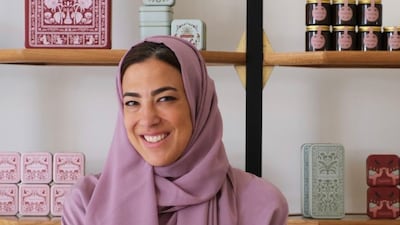Sharing food with friends, neighbours and those in need is a custom passed down for generations during Ramadan.
This year, the younger generation of Saudis are adding an artistic twist to the packaging of Ramadan gifts, bringing a smile to the faces of many.
“It does not matter what your financial status is, we cook, order or create personalised Ramadan packages to gift to our friends, relatives and neighbours,” says Lama Taleb, a Saudi graphic designer in Jeddah.
“We also make grocery boxes and give away toys in less advantaged neighbourhoods.
“This Ramadan I got products from Musa & Palm in Jeddah. I love their packaging, adding prayer beads and Ramadan colouring books for kids, as a Ramadan gift for my friends.”
Musa & Palm sell luxury dates stuffed with unusual flavours such as figs and goat's cheese. Founder Suha Mousa says their offerings tell the story of her Saudi ancestors and highlight the kingdom's heritage.
“Gourmet food is a form of art, and it’s time that the world experiences what Saudi Arabia has to offer in terms of culinary innovation,” said Suha tells The National.
“This Ramadan we are combining finest dates with unique fillings encased in wonderful, limited edition gift boxes that depict the flora of Saudi Arabia.”
Saudi women also get together to collaborate on packaging and branding for exclusive products.
Kaak Alfarah, the brainchild of Taif resident Afaf Al Mutiry, sells authentic Arabic sweets in decorated boxes branded by Zahar Al Sayed, a cultural and creative consultant in Jeddah.
It all started when Afaf's friends in Madinah, where she grew up, encouraged her to sell the sweets she used to make at home, where they became popular, she tells The National.
“Back in 2010-2011 I used to make cupcakes,” she says.
“There were very few Saudi women in the workplace and it was hard to find work. I felt it wasn't suitable for me to work and have fun, so I stopped.”
Asaf reflects on how society has changed since Vision 2030 opened doors for women, empowering them in different fields and positions. Many women now own their own businesses, small or large.
She reached out to Zahar to help her rebrand and market the products with a “fun and trendy” approach.
“Her sweet products and my branding went viral. We collaborated during Covid-19, when she reached out to me,” says Zahar. “It was so much fun.”
“She was already famous in Taif, but after the rebranding, it got famous with people in Riyadh and Jeddah and grew from there.”
Zahar hopes the collaboration will mean mamoul — date stuffed biscuits — are loved by more people and become trendy.

This year, Kaak Alfarah is also selling in Dubai and Kuwait.
Foreign residents are also part of yearly Ramadan fairs and exhibitions across the country, showcasing their creative ideas.
Dema, a Turkish national in Jeddah, sells luxury confectionery and unique desserts with Mediterranean flavours.

Her latest Ramadan gifts are available at Ana Special Mall in Jeddah “and people can order through her Instagram page”, she tells The National.
During Ramadan, many locals take to the streets to sell home-made drinks and food.
The iftar items are sold before sunset on the streets or at a local market. They include traditional favourites such as sobia (a sweet drink made of barley or rice), luqaimat (sweet fried dough balls), sambousa, Saudi coffee and qatayef (pancakes with a sweet filling).

“My mother always buys sobia from a lady in Ramadan, every year. She sells around a corner sometimes and mostly from home when it gets too hot,” says Ahmad Hawandji, a Saudi shopper in Jeddah.
“I love trying new things on the street whether its luqaimat or coffee.”

